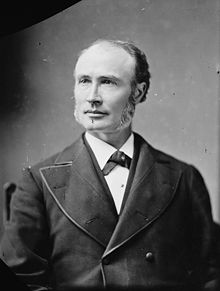William Claflin
| William Claflin | |
|---|---|

|
|
| 27th Governor of Massachusetts | |
|
In office January 7, 1869 – January 4, 1872 |
|
| Lieutenant | Joseph Tucker |
| Preceded by | Alexander H. Bullock |
| Succeeded by | William B. Washburn |
| Member of the U.S. House of Representatives from Massachusetts's 8th district |
|
|
In office March 4, 1877 – March 3, 1881 |
|
| Preceded by | William W. Warren |
| Succeeded by | John W. Candler |
| 27th Lieutenant Governor of Massachusetts | |
|
In office January 4, 1866 – January 7, 1869 |
|
| Governor | Alexander H. Bullock |
| Preceded by | Joel Hayden |
| Succeeded by | Joseph Tucker |
| 4th Chairman of the Republican National Committee | |
|
In office 1868–1872 |
|
| Preceded by | Marcus L. Ward |
| Succeeded by | Edwin D. Morgan |
| Member of the Massachusetts House of Representatives | |
|
In office 1849-1853 |
|
| Personal details | |
| Born |
March 6, 1818 Milford, Massachusetts |
| Died | January 5, 1905 (aged 86) Newton, Massachusetts |
| Political party |
Free Soil Republican |
| Religion | Methodist |
William Claflin (March 6, 1818 – January 5, 1905) was an American politician, industrialist and philanthropist from Massachusetts. He served as the 27th Governor of the Commonwealth of Massachusetts from 1869–1872 and as a member of the United States Congress from 1877–1881. He also served as chairman of the Republican National Committee from 1868–1872, serving as a moderating force between the Radical and moderate wings of the Republican Party. His name is given to Claflin University in South Carolina, a historically black college founded with funding from him and his father.
Claflin was educated at Brown University, and worked in his father's shoe manufacturing business before becoming a partner in it. An opponent of slavery, he helped establish the state's Free Soil Party before dominating the state's Republican Party establishment in the 1860s. He supported a number of social reforms, including increased property and voting rights for women, and was the state's first governor to actively support full women's suffrage. He supported many charitable causes, and promoted the development of the village Newtonville, where his country estate was located.
William Claflin was born on March 6, 1818 in Milford, Massachusetts, to Lee and Sarah (Adams) Claflin. Lee Claflin was a self-made proprietor of a tannery and shoe factory in Milford, and a politically active abolitionist. William was educated first in the local schools and then at Milford Academy, before he enrolled in Brown University in 1833. His mother died in 1834 and his health was poor, so he left school and entered his father's business. After three years, with his health not improving, he traveled to St. Louis, Missouri, where from 1838 to 1844 he worked in the wholesale leather goods business. He then returned to Massachusetts after his health improved, where he rejoined the family business and settled in Hopkinton.
...
Wikipedia
